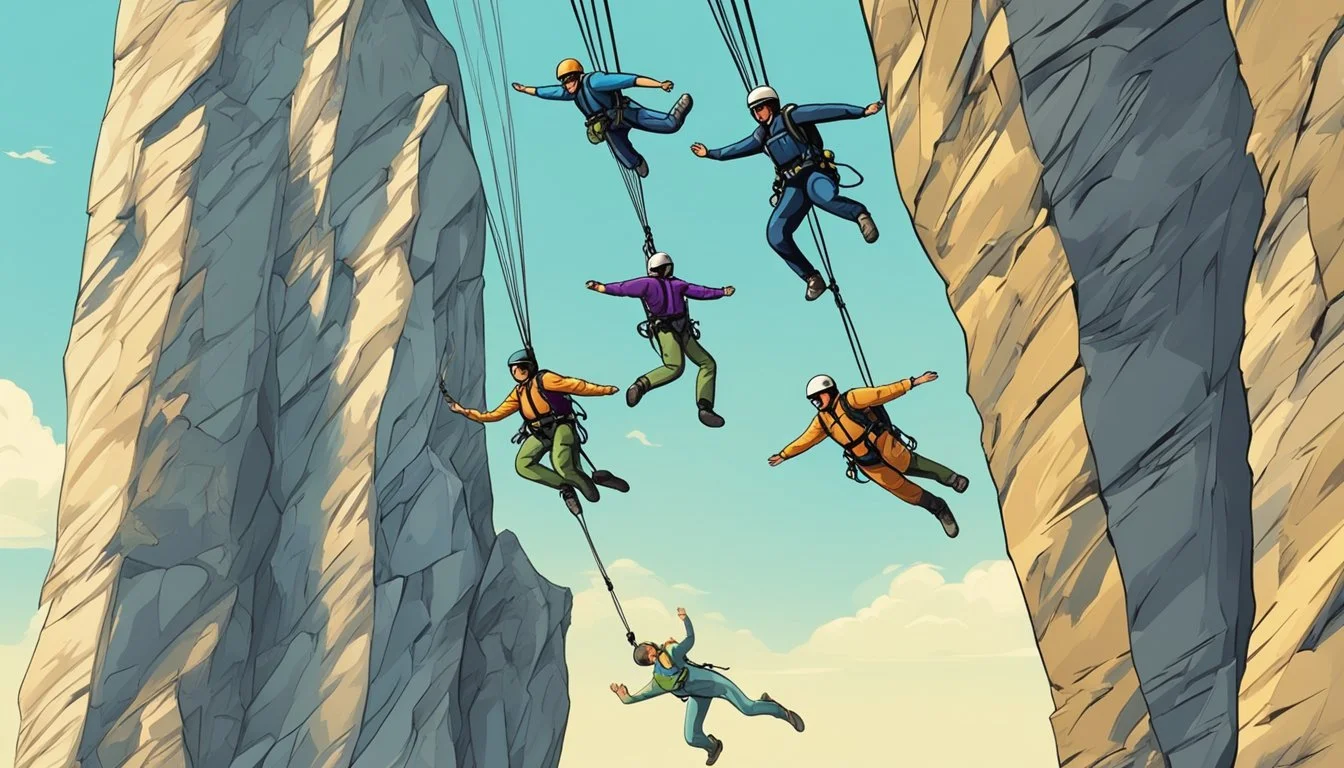9 Reasons Why Narcissists Often Pursue Extreme Sports and Risky Hobbies
Unveiling the Thrill-Seeker Mindset
Narcissists are often associated with grandiose self-views, a desire for admiration, and a lack of empathy, characteristics that make them more likely to engage in activities that set them apart from the average person. Extreme sports and risky hobbies offer a unique platform for narcissists to seek the thrill and recognition they crave. Understanding why narcissists gravitate towards these high-risk activities can shed light on their psychological motivations
The interplay between narcissism and extreme activities is worth exploring, as it unveils patterns and behaviors that align with the narcissist's personality traits. These pursuits often satisfy their need for dominance, validation, and a sense of superiority. The relationship between narcissism and high-risk endeavors is complex, involving a mix of psychological factors that drive their attraction to these challenging and often dangerous activities.
1) Adrenaline Rush
Adrenaline is a key factor why narcissists may pursue extreme sports and risky hobbies. The thrill and excitement these activities provide can be highly appealing. The moment of engaging in danger triggers the release of adrenaline.
This hormone increases heart rate and blood flow, creating a feeling of intense arousal. Narcissists often seek this sensation, as it can temporarily boost their self-esteem and confidence. The physical rush can be addictive, driving them to seek new and greater challenges.
Engaging in extreme sports often allows narcissists to stand out. The pursuit of high-risk activities can be seen as a way to gain admiration and recognition from others.
In the world of extreme sports, the adrenaline rush becomes a core motivator. The release of adrenaline and dopamine natural high, enhancing their overall experience and satisfaction.
The pursuit of an adrenaline rush can be linked to a need for excitement. Engaging in high-risk activities satisfies this need, making extreme sports particularly attractive to those with narcissistic tendencies. The psychological benefits, including increased focus and clarity, further contribute to their fascination with these activities.
In summary, the adrenaline rush provided by extreme sports is a powerful draw for narcissists. It fuels their desire for excitement, recognition, and a temporary boost in self-esteem.
2) Reward Sensitivity
Narcissists are often driven by heightened sensitivity to rewards. This psychological trait means they are more motivated by potential gains than the fear of consequences.
In extreme sports, the thrill of victory or achieving a significant milestone is a powerful incentive. This reward-driven motivation eclipses any potential risks involved.
Studies suggest that their focus on rewards, such as personal fame or social recognition, encourages narcissists to engage in high-risk activities, seeking the exhilaration that accompanies success.
These individuals perceive the benefits, like admiration and status, as substantial. Consequently, they are willing to face physical and emotional risks to attain these rewards.
Additionally, the mental benefits derived from these activities, such as enhanced self-efficacy and self-worth, are particularly appealing to narcissists. They see extreme sports as a platform to showcase their abilities and boost their self-image.
Narcissists often view the potential dangers as secondary to the rewards, making them more inclined to pursue these risky hobbies. This emphasizes their penchant for behaviors that promise significant payoffs.
3) Desire for Attention
Narcissists often pursue extreme sports and risky hobbies to capture attention. They thrive on being in the spotlight and these activities provide a dramatic way to stay visible.
Eyes and ears on them serve as proof that they are special and worthy. The visual and physical feats involved in extreme sports naturally attract spectators, giving narcissists the validation they crave.
Public recognition, whether through social media or live audiences, fuels their ego. By participating in high-adrenaline activities, narcissists achieve a sense of superiority and importance.
Narcissists seek situations where their achievements are evident to others. Extreme sports and risk-taking behaviors provide these opportunities, making such hobbies especially appealing.
Their need for admiration drives them to constantly seek more thrilling and risky endeavors. This allows them to maintain the admiration and attention they desire.
Links to the relevant search results include the desire for attention in narcissists and the impact of extreme sports.
4) Control Over Outcomes
Narcissists often seek to control their environment and outcomes. Engaging in extreme sports allows them to navigate situations where their skills and decisions directly impact results. This desire for control can be a significant motivator for pursuing activities where they alone determine success or failure.
In risky hobbies, the unpredictable nature of the environment challenges their ability to exert skill and dominance. These activities provide a platform for them to showcase their competence and mastery over chaotic situations. The personal satisfaction derived from this control can be a powerful reinforcement.
By choosing extreme sports, narcissists avoid scenarios where their success depends on team dynamics or collective decision-making. They prefer settings where their individual efforts are highlighted and the outcomes are a direct consequence of their actions. This autonomy reinforces their self-perception of superiority and uniqueness.
5) Escape from Reality
Narcissists often turn to extreme sports and risky hobbies as a form of escape from reality. Their daily lives can be filled with dissatisfaction and a constant need for admiration.
Engaging in adrenaline-pumping activities can provide a temporary distraction from their internal struggles.
These pursuits allow them to immerse themselves in the present moment. The thrill and danger of extreme sports demand their full attention, leaving little room for self-reflection or doubt.
This escape can be appealing as it offers a break from the pressures of maintaining their grandiose self-image.
Moreover, the intensity of these activities can serve as a temporary cure for their feelings of emptiness. Narcissists may feel a fleeting sense of accomplishment and gratification when they conquer challenging physical feats.
By focusing on extreme sports, they can avoid facing uncomfortable thoughts about their vulnerabilities or shortcomings.
The environment of extreme sports also provides a stage for them to showcase their daring nature.
The sense of escape combined with the opportunity to impress others makes risky hobbies an attractive choice for many narcissists.
6) Need for Validation
Narcissists often seek out extreme sports and risky hobbies due to their deep-seated need for validation. They crave constant attention and admiration from others, which can be achieved through their participation in high-adrenaline activities.
In extreme sports, the spotlight is on the individual performer, allowing narcissists to feel special and significant. The recognition and focus they receive from others can greatly boost their self-esteem.
Narcissists frequently seek activities where their achievements are visible to a wider audience. Engaging in risky hobbies can also serve as a way for them to prove their superiority and gain admiration.
Moreover, high-risk activities provide narcissists with a platform to showcase their courage and physical prowess. This public display of skills further feeds their need for validation.
For many narcissists, the external validation gained from these pursuits is more important than personal enjoyment. They prioritize actions that reinforce their self-image as exceptional and worthy of attention.
Their involvement in extreme sports and risky hobbies can often be linked to their desire to continuously affirm their self-worth in the eyes of others. The thrill of these activities combined with the outward praise they receive can be immensely gratifying for them.
7) Testing Personal Limits
Narcissists are often drawn to testing their personal limits through extreme sports and risky hobbies. These activities provide a unique platform for them to showcase their abilities and push their boundaries.
Engaging in such activities allows individuals to demonstrate their physical and mental prowess. This need to test oneself aligns with the narcissistic traits of seeking admiration and validation.
Extreme sports, in particular, offer a clear and measurable way for individuals to challenge themselves. Whether it's completing a tough rock climb or mastering a new extreme skiing technique, these pursuits require immense dedication and effort.
The concept of the "flow state," described by psychologist Mihaly Csikszentmihalyi, is relevant here. In a flow state, individuals feel completely immersed and focused, which is often achieved during extreme sports.
Narcissists may be especially motivated to enter this state, as it provides a sense of control and mastery. By continually pushing their limits, they can maintain a sense of superiority and control over their environment.
8) Thrill-Seeking Behavior
Narcissists often engage in thrill-seeking behaviors due to their need for excitement and stimulation. This drive for high-intensity experiences can lead them to pursue extreme sports and risky hobbies.
Thrill-seeking behavior is linked to high levels of impulsivity. Individuals with narcissistic traits may find these activities particularly rewarding as they provide immediate gratification.
Studies suggest that in modernized societies, people may seek out risky activities to compensate for feelings of restriction by societal safety norms. This aligns with the compensation theory, which explains why some individuals are drawn to high-risk activities.
The inherent danger in extreme sports offers a sense of empowerment and invincibility. This attraction to danger can be stronger in those with narcissistic traits, who may view it as an opportunity to demonstrate superiority and dominance.
Participants in extreme sports often report feeling more alive and fulfilled. The proximity to danger can heighten their senses, making everyday concerns seem trivial in comparison. This existential element can be especially appealing to narcissists.
9) Impression Management
Narcissists are known for their keen focus on impression management. This involves carefully curating their image to appear more impressive and powerful in the eyes of others. By participating in extreme sports, they can project boldness and a fearless demeanor.
Engaging in risky hobbies allows them to demonstrate confidence and superiority. Extreme sports often attract attention and admiration, which narcissists crave. This public display helps them to manipulate how others perceive them.
Charm and wit are tools narcissists use to influence perceptions. They use these traits to gain admiration and support. Impression management extends to how they present their accomplishments and risks undertaken in these sports.
Public praise is another tactic in their arsenal. When narcissists receive recognition for their extreme sports exploits, they ensure it is done publicly. This boosts their image while hiding any harsh behaviors exhibited privately.
Narcissists often employ impression management to gain promotional benefits in professional settings. Their participation in daring activities can position them as leaders. By being seen as risk-takers, they enhance their allure and perceived competence.
For more information on impression management, you can read about the art of impression management and its implications. These insights reveal the depth of strategies narcissists use to shape their image for personal gain.
Psychological Profiles of Narcissists
Narcissists often exhibit distinct psychological characteristics such as a need for admiration and a desire for dominance. These traits heavily influence their behaviors and choices, including their inclination towards extreme sports and risky hobbies.
Need for Admiration
One defining trait of narcissists is their need for admiration. This need stems from a deep-seated desire to have their self-worth constantly validated by others. Narcissists often engage in behaviors that draw attention and praise. Their actions are frequently calculated to ensure they remain in the spotlight, basking in the positive regard of peers and strangers alike.
Social media often becomes a platform where narcissists seek validation. They curate their online personas meticulously, sharing only the most flattering and impressive aspects of their lives. In real-life interactions, they tend to dominate conversations, often steering topics towards their achievements and perceived superiority.
Narcissists are also prone to exaggerating their accomplishments to garner admiration. They may present themselves as more talented, successful, or knowledgeable than they actually are. This constant pursuit of admiration can lead them towards high-risk activities that provide opportunities for public recognition.
Desire for Dominance
Another central aspect of the narcissistic psychological profile is a desire for dominance. Narcissists often perceive life as a constant competition where they must come out on top. They seek control and power in various aspects of their lives, often at the expense of others.
Workplaces frequently highlight this trait, as narcissists strive to reach positions of power. They utilize impression management techniques to convey competence and authority. This can explain why narcissists get promoted quickly.
In social settings, narcissists may undermine others to elevate their status. They are vigilant in recognizing status cues and will take calculated steps to either boost their own standing or diminish that of others. This desire for dominance is closely tied to their involvement in extreme sports, where they can display their superiority and control in high-pressure environments.
Attraction to Risk and Adrenaline
Narcissists often gravitate towards extreme sports and risky hobbies due to their innate attraction to thrill-seeking behaviors and the unique reward systems in their brains that respond to adrenaline.
The Thrill-Seeking Behavior
Narcissists tend to exhibit higher levels of thrill-seeking behavior compared to others. This can be seen in their pursuit of dangerous activities such as rock climbing, skydiving, and motor racing. These activities provide a high level of excitement and a sense of accomplishment that feeds their need for validation and superiority.
Such activities often require immense focus, which helps them momentarily escape the mundane aspects of everyday life. Additionally, the inherent risks involved offer a medium through which narcissists can showcase their bravery and skills, further boosting their self-esteem.
The constant search for new and more dangerous challenges aligns well with their personality traits, where boredom is often seen as a significant enemy. They are driven to push boundaries and seek new experiences to maintain their sense of importance and excitement.
Reward System in the Brain
The brain's reward system plays a crucial role in the behavior of narcissists engaging in extreme sports. Activities that involve high risk and physical exertion lead to the release of adrenaline, dopamine, and endorphins. This biochemical cocktail creates a pleasurable sensation similar to what gamblers experience.
Narcissists often have a heightened response to these neurochemicals, which reinforces their risky behaviors. The thrill and euphoria derived from these activities become addictive, making them compelling to individuals who crave constant excitement.
Furthermore, the admiration and attention received from peers and spectators during these extreme sports activities serve to reinforce their behavior. This public approval acts as an additional reward, feeding their narcissistic tendencies and creating a cycle of continuous risk-taking for validation.












